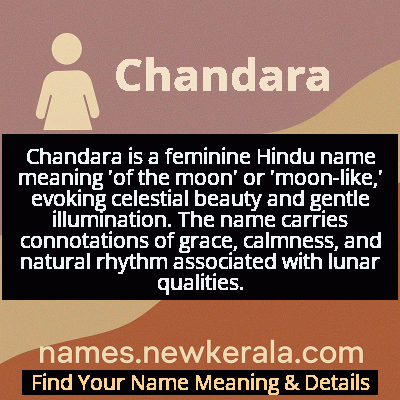Chandara Name Meaning & Details
Origin, Popularity, Numerology Analysis & Name Meaning of Chandara
Discover the origin, meaning, and cultural significance of the name CHANDARA. Delve into its historical roots and explore the lasting impact it has had on communities and traditions.
Name
Chandara
Gender
Female
Origin
Hindu
Lucky Number
5
Meaning of the Name - Chandara
Chandara is a feminine Hindu name meaning 'of the moon' or 'moon-like,' evoking celestial beauty and gentle illumination. The name carries connotations of grace, calmness, and natural rhythm associated with lunar qualities.
Chandara - Complete Numerology Analysis
Your Numerology Number
Based on Pythagorean Numerology System
Ruling Planet
Mercury
Positive Nature
Adventurous, dynamic, curious, and social.
Negative Traits
Restless, impatient, inconsistent, prone to indulgence.
Lucky Colours
Green, white.
Lucky Days
Wednesday.
Lucky Stones
Emerald.
Harmony Numbers
1, 3, 9.
Best Suited Professions
Sales, marketing, travel, entertainment.
What People Like About You
Versatility, charisma, adventurous spirit.
Famous People Named Chandara
Chandara Sopheak
Classical dancer
Preserved and promoted Cambodian Apsara dance traditions internationally
Chandara Khouen
Environmental activist
Established community-based conservation programs along the Mekong River
Chandara Lim
Linguistics researcher
Documented endangered dialects and oral traditions in Southeast Asia
Name Variations & International Equivalents
Click on blue names to explore their detailed meanings. Gray names with will be available soon.
Cultural & Historical Significance
The name's cultural importance extends beyond religious contexts into artistic and literary traditions. In classical Indian poetry and Cambodian literature, Chandara and its variations frequently appear as epithets for beautiful, wise women or as metaphors for gentle illumination. The name also reflects the agricultural significance of lunar cycles in traditional societies, where moon phases guided planting and harvesting. This connection to natural rhythms made the name particularly meaningful in rural communities, symbolizing harmony with cosmic patterns and the enduring cycle of life.
Extended Personality Analysis
Women named Chandara are typically associated with a serene, contemplative nature that mirrors the moon's calm presence. They often possess strong intuitive abilities and emotional intelligence, enabling them to understand unspoken feelings and navigate complex social situations with grace. Their personality combines creative sensitivity with practical wisdom, making them both visionary and grounded in their approach to life's challenges. They tend to be natural peacemakers who value harmony and seek to create balanced environments in their personal and professional relationships.
Chandara's are frequently characterized by their loyalty, depth of feeling, and capacity for nurturing others. While they may appear reserved in unfamiliar settings, they reveal warm, engaging personalities to those they trust. Their strength often lies in quiet persistence rather than overt assertiveness, and they excel in roles requiring patience, observation, and thoughtful response. The lunar association suggests someone who understands cycles and timing - knowing when to act and when to wait, when to shine brightly and when to reflect quietly. This rhythmic understanding of life often makes them excellent strategists and trusted advisors.
Modern Usage & Popularity
In contemporary naming practices, Chandara maintains a steady presence as a traditional yet distinctive choice for girls in Hindu families across India, Cambodia, and global diaspora communities. The name enjoys moderate popularity without being overly common, appealing to parents seeking cultural authenticity combined with melodic sound. Recent decades have seen the name adopted by urban educated families who appreciate its classical roots while valuing its uniqueness in modern settings. Usage patterns show consistency across generations rather than dramatic popularity shifts, indicating its enduring appeal. In Western countries with significant South Asian populations, Chandara serves as a cultural bridge name - familiar enough to pronounce while distinctly representing heritage. The name's lunar symbolism continues to resonate with contemporary values of environmental awareness, feminine strength, and spiritual connection.
Symbolic & Spiritual Meanings
Symbolically, Chandara embodies the moon's multifaceted meanings across cultures - representing illumination that reveals without blinding, guidance that suggests rather than commands, and cycles that promise renewal. The name metaphorically suggests the ability to find clarity in darkness, to influence gently rather than control forcefully, and to understand the natural rhythms of growth and change. Like moonlight that transforms ordinary landscapes into magical scenes, the name implies the capacity to perceive hidden beauty and potential in people and situations. It also carries the symbolism of reflection - both in the literal sense of moonlight reflecting sunlight, and the philosophical sense of thoughtful contemplation. The name suggests someone who can absorb wisdom from various sources and reflect it back in transformed, accessible ways, acting as a mediator between different perspectives and bringing illumination to complex matters.

